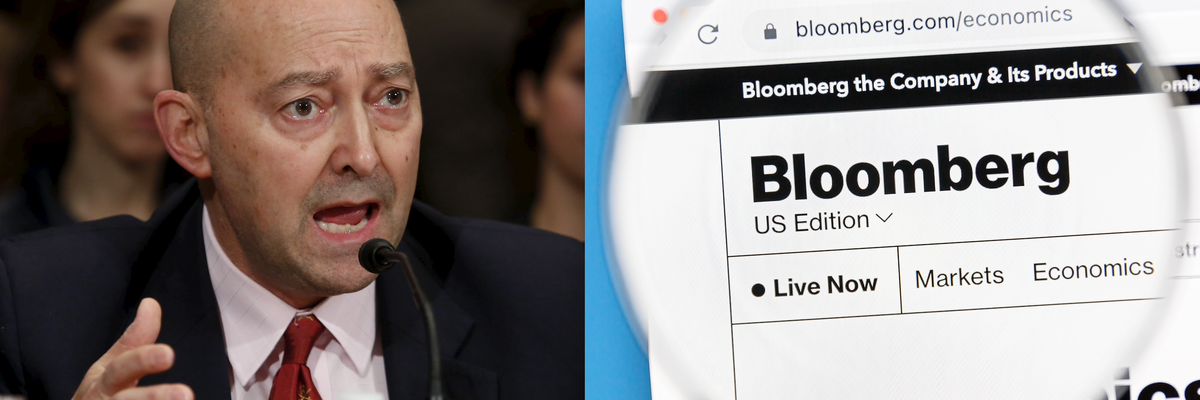A prominent regular columnist for Bloomberg Opinion, Ret. Adm. James Stavridis, has published multiple columns over the past year urging greater U.S. investments in cybersecurity and cyber-defenses while failing to disclose to readers potential conflicts of interest due to work in the defense industry.
Stavridis is paid to sit on the board at Fortinet, a cybersecurity firm, and he is also a senior adviser role at Shield Capital, a venture capital firm that launched a $120 million “National Security Venture Capital Fund” to “support entrepreneurs building technologies critical to commercial and national security customers,” according to Shield Capital’s March 2022 press release.
“SHIELD is operational with a focused investment strategy in four high-growth frontier technology domains: artificial intelligence, autonomy, cybersecurity and space,” read another press release by the firm. Stavridis regularly advocates for increased defense spending in those fields, often without disclosing his own financial interests in steering tax dollars toward heightened Pentagon spending.
Stavridis, a former NATO Supreme Allied Commander Europe and currently the vice chair of global affairs and managing director at the Carlyle Group, a global investment firm. Carlyle “has actively invested in the Aerospace and Government Services industries for over three decades,” making Stavridis an experienced advocate for various weapons and defense-oriented companies.
Readers of Stavridis’s columns are told in his Bloomberg bio that his only professional affiliation is with the Carlyle Group, but his focus on cybersecurity and cyber-defense spending are frequently touched on in his articles.
Bloomberg altered Stavridis’s bio following an email from Responsible Statecraft inquiring about his undisclosed ties to various defense contractors. Bloomberg added to his bio, “He is on the boards of American Water Works, Fortinet, PreVeil, NFP, Ankura Consulting Group, Michael Baker and Neuberger Berman, and has advised Shield Capital, a firm that invests in the cybersecurity sectors,” and posted an “Editor’s Note” at the bottom of his columns, saying, “Admiral Stavridis’s bio has been updated to reflect his more recent board and advisory roles.”
“We have updated Admiral Stavridis’s bio and added an editor's note to all of his relevant Bloomberg Opinion columns to reflect his more recent board and advisory roles,” a spokesperson for Bloomberg News told Responsible Statecraft.
While now offering a blanket disclosure of Stavridis’s corporate affiliations, Bloomberg did not add any notification of specific potential conflicts of interest in columns by Stavridis.
In March, Stavridis published a Bloomberg column with the headline, “The U.S. Military Needs to Create a Cyber Force.” “Most important, the creation of a US Cyber Force would move America beyond the current ‘pick-up team’ approach to cybersecurity, wherein each of the armed forces has a small number of cyber experts (most of whom rotate in and out of pure cyber jobs),” wrote Stavridis.
In January, Stavridis published a Bloomberg column with the headline, “Expect the Unexpected in 2023: Cyberattacks and the Next Covid,” in which he offered this dire warning, “A 9/11-level cyber event could be directed against America’s vulnerable transportation grid (look at how airlines were brought to their knees by a severe winter storm this week, and how easily airports had their customer websites hacked in October), our shaky electric utilities (tens of thousands of customers around the nation lost power last year after simple acts of vandalism), and the financial system (well defended, but still a tempting target).”
“Beware cyberattacks and pandemics lurking beneath the waves of an already chopping international sea,” he concluded. In December 2022, Stavridis published a Bloomberg column urging the newly announced House Select Committee on China to form “an interagency, international and public-private strategy for facing a rising China,” as an “end product.”
“The first [pillar of this strategy] should be in defense, focusing on cyberwar, AI, space, hypersonic weapons, maritime platforms and unmanned systems,” wrote Stavridis.
And in February 2022, Stavridis claimed the West’s “cyber appeasement helped give Putin a green light [to invade Ukraine]” by failing to respond more strongly to Russian cyberattacks. “The U.S. needs to develop a sense of deterrence in cyber, and doing so will require more aggressive responses than it has been willing to employ thus far,” he wrote.
None of these columns revealed Stavridis’s financial interests in the cyber domains, effectively concealing a potential conflict of interest that runs across multiple columns by the retired admiral.
This isn’t the first time that Stavridis’s financial interests have gone undisclosed.
In 2016, I reported on how Stavridis, then a regular contributor to ForeignPolicy.com, often promoted defense spending and weapons systems that could benefit Northrop Grumman, where Stavridis then chaired the company’s international advisory board.
Intelligence Online also noted Stavridis’s “thriving business career in defence and finance,” reporting that he “has held board and executive seats with around twenty companies, almost all with extensive defence interests.”
“In 2016 – a year Hillary Clinton’s presidential campaign publicly vetted him as a potential vice presidential nominee – he resigned after he was criticised for potential conflicts of interest raised by his position at Northrop, which he hadn't disclosed in his media bylines and appearances,” reported Intelligence Online in February.
Stavridis did not respond to requests for comment.
















